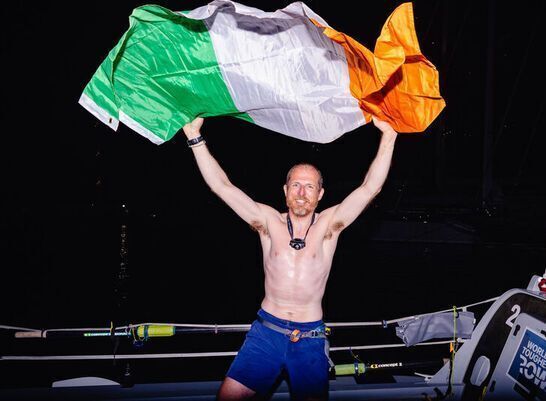“Under the Impression” is Kyle Darcy's second novel.
By Peter McDermott
Kyle Darcy is fascinated with the issue of perception vs. reality.
And it’s an underlying theme in his second novel, “Under the Impression,” which takes place from the dying days of World War II in Europe through to the America of the mid-1990s.
Just take his main characters. “They are who they say they are. But on another level, they are who they are pretending to be,” the Belfast-born novelist said. One is an apparent philanthropist, but is really a Nazi sympathizer; another is an outwardly successful businesswoman who runs a drug cartel.
“And finally,” he said, “there’s a young Irish immigrant with ties to organizations in Northern Ireland and Washington DC.” He has been recruited as an agent on behalf of the U.S. government’s counter-response.

Kyle Darcy.
Darcy likes the kind of thriller in which the action is inspired by real events. It’s what attracted him to the novels of Frederick Forsyth, who wrote, for example, “The Odessa File” and “The Day of the Jackal.” In the latter, the French right-wing terrorist group OAS hires the hitman of the title to kill President Charles de Gaulle. The “Jackal” was an invention, as was the assassination plot. However, there were real-life attempts on the president’s life, one of which is included in the action of the novel, and its screen adaptation. Likewise, “The Odessa File” uses the story of the real-life Austrian-born SS officer Eduard Roschmann, who escaped to Argentina after the war and died in Paraguay.
Darcy’s “Under the Impression” has post-war Nazis nursing a major grudge in Bolivia, and they decide it’s payback time for the destruction of the Third Reich, just 12 years into its proposed 1,000-year reign. Their methods involve using Colombian drug cartels to wreak havoc on American life. The plot brings the reader up to the 1994 FIFA World Cup.

The picture was taken during the pre-game show ahead of the 1994 FIFA World Cup Final involving Brazil and Italy at the Rose Bowl, Pasadena, Calif. INPHO/BILLY STICKLAND
Darcy’s first novel, “Under Current Conditions,” was based on real events, although he decided to fictionalize it “primarily because I knew all the characters, but the one character I did not meet was the kidnap victim.” He had no desire to track down and quiz that person. Nonetheless, he felt “morally obligated” to tell the story of “Under Current Conditions,” which draws on a few weeks in 1999 that were for him an “incredible experience.” Before that, he had had no aspirations to be a novelist.

Adolf Eichmann, in a 1942 photo, was the highest-profile Nazi to find his way to South America.
At the outset, Darcy decided that a trilogy was a possibility and so put a hook in “Under Current Conditions” that allowed for a prequel, which is what “Under the Impression” is. Ultimately, the first book reached the Boston Globe’s bestseller lists.
Getting words on the page is a relatively uncomplicated process for him. Taking them off is more difficult. “I’m very fortunate in having my wife and son to help me with that,” he said. “They come at it with a fresh mind and a fresh set of eyes.”
The family traveled from Belfast 30 years ago when his son— now a first responder in the Chicago area — was young. Darcy had graduated with a civil engineering degree from the University of Ulster in the 1980s and got work with general contractors in Lisburn, Co. Antrim. “You were always going in and out of areas where you weren’t known,” he recalled. “The construction industry suffered a lot from the strife. I was lucky. Because of my degree, I was able to get a job in Boston.” His father’s brother and other extended family members helped with the move.
His father was a Connemara, Co. Galway, native whose job took him north of the border. His mother is from Rush, North County Dublin. The writer can fondly remember picking tomatoes in glasshouses there during the summers of his youth. Connemara was also a favorite destination for the family, and these days one sister resides there, while his other two sisters and his two brothers live in Northern Ireland. His mother, who recently celebrated her 89th birthday, has an apartment near Queen’s University in Belfast. “She’s still running around like a teenager,” her son said, or was before the lockdown.
Darcy considers himself extremely lucky to have employment when others don’t. He heads up the construction department for a Boston developer, and is working from home like so many, with Zoom meetings now part of his life. “We do multi-residential developments along the East Coast — New Hampshire down to Virginia,” he said. “All my projects continue to go.” The states involved have designated the work essential.
“My work requires a lot of writing. Once you sign a contract and the ink is dry, you immediately start writing letters to the owner telling him why it must take longer and cost more money,” he said, with a laugh, “And then you have to write to subcontractors to tell them why you have to pay them less.”
More seriously, he said that the faculty at the University of Ulster always stressed communications skills. “You have to focus on the importance of how you convey your message,” Darcy said.
On the job, one can get feedback looking into someone’s eyes or in an email response. When writing fiction, he said, “that’s a luxury you don’t have.”
Darcy said, “You want the reader to get to the end. If the reader doesn’t get to the last page, it’s all for naught. So you have to keep their attention throughout.”
And capturing people’s attention is far from easy these days, he said, pointing to the news media as an example.
“We were able to sip our news through a straw, sip it and savor it and understand it. Now it’s coming at us out of a fire hydrant,” he said. “So fast.”
Years ago, a small item in the world news section of New York Times might pique one’s interest, leading to further research. That’s less the case now. People don’t get a chance or take the time to delve deeper.
Well, he does, of course. It’s a pleasurable part of the work to read something like “Cocaine: An Unauthorized Biography” by Dominic Streatfeild. And there are other fun aspects to novel-writing, too.
“I really enjoy the challenge of forming characters and developing a plot,” Darcy said. “And painting colorful pictures in people’s minds. You only have black ink on white paper. That’s the challenge.”
“Under the Impression” can be ordered at Amazon.com.







